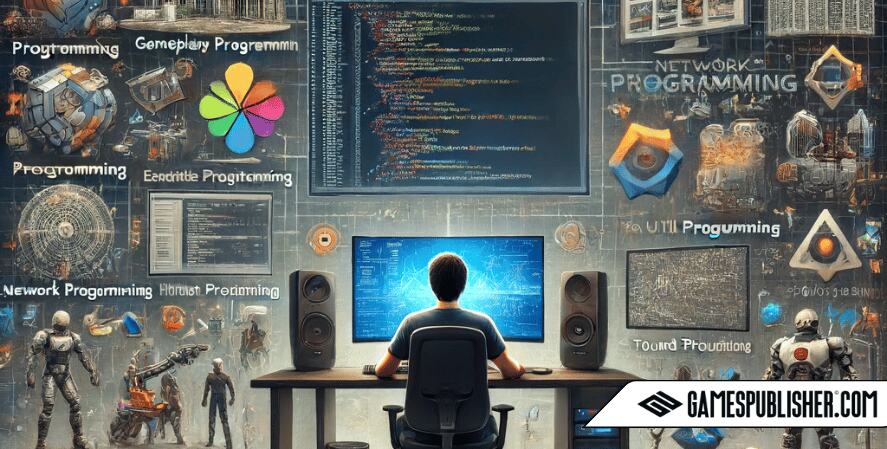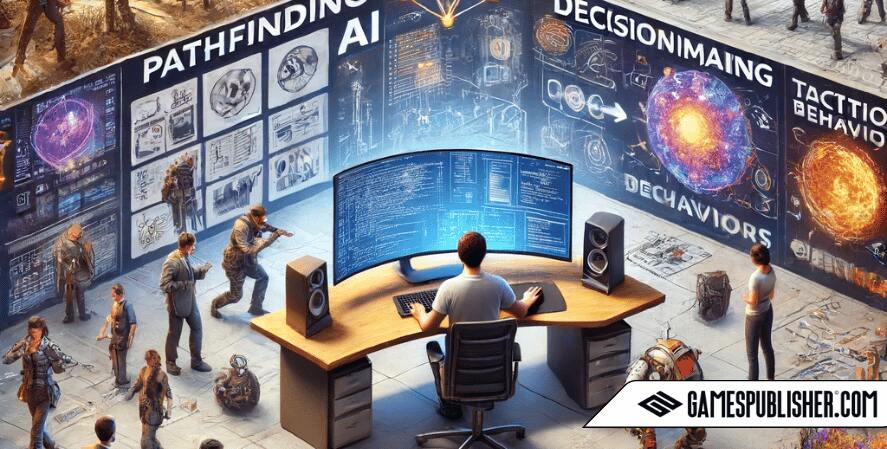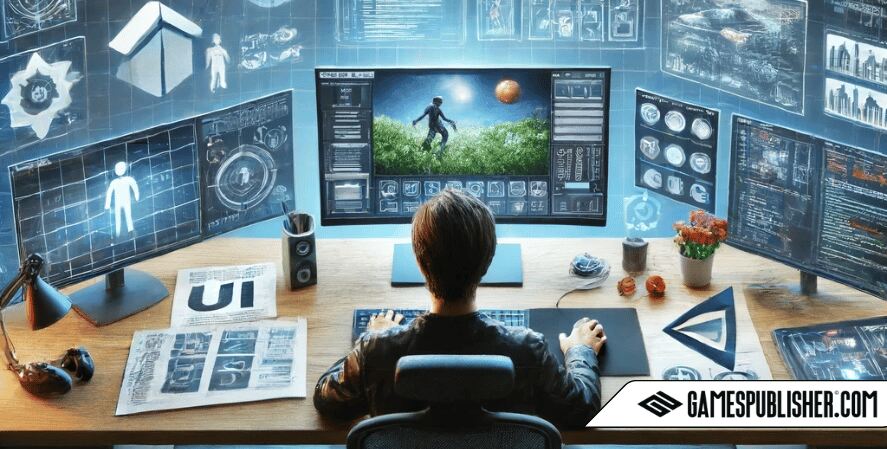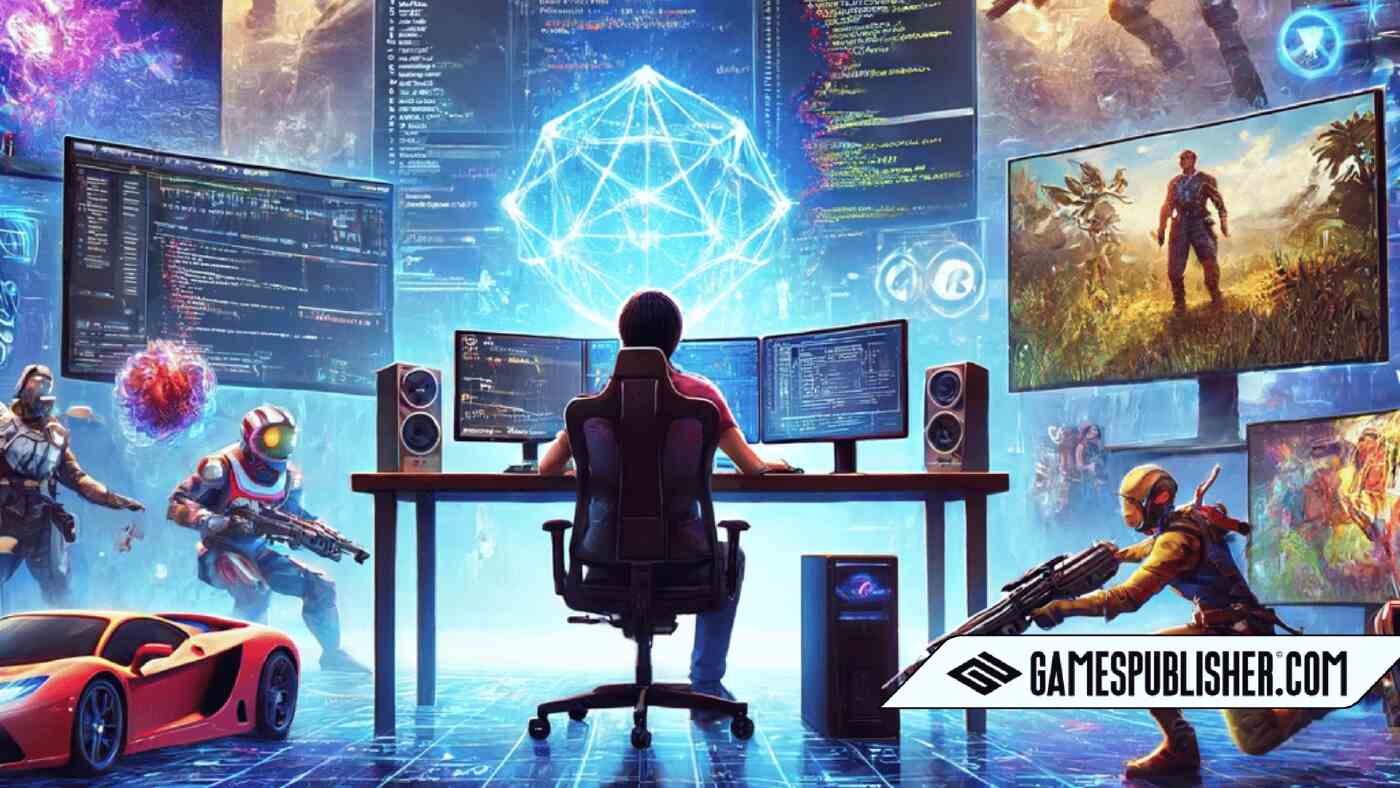Gamespublisher.com is a premier resource for game developers and publishers seeking insights. Aspiring game developers, seasoned programmers, and publishers find comprehensive guidance here. We provide in-depth articles, tutorials, and industry news for navigation.
The Importance of Programming in Video Games
Programming is the backbone of video game development. Game programming weaves together every game element, from mechanics to visuals. Skilled programmers transform designers’ ideas into immersive experiences. Without them, concepts stay mere ideas. We’ll explore game programmers’ essential roles in development and publishing.
Relation to Game Development and Publishing
Creating successful video games requires understanding different programming roles. Game developers must value technical complexity. Publishers need to see the scope of programming work. This helps manage project timelines and budgets effectively. Exploring different programming roles shows how the video game industry works.
Overview of Game Programming

Definition and Importance
Game programming involves writing the code that makes video games function. This includes everything from the game engine to gameplay. It covers graphics, AI, and more.. Game programming is very important. It is the foundation for all game features. It lets designers’ visions become interactive.
Diverse Programming Roles
Game programming has many specialized roles. Each one focuses on a different aspect of game development. These roles include programming for gameplay, graphics, engines, AI, networks, physics, tools, sound, UI, and scripting. Each role needs unique skills. They also contribute differently to game development.
Gameplay Programming
Core Mechanics
Gameplay programmers develop the core mechanics of a game. These mechanics dictate how the game is played. They make the rules and logic that govern player interactions. They ensure the gameplay is fun and challenging. This includes developing systems for movement, combat, puzzles, and other interactive elements.
Character Controls and Interactions
Creating intuitive and responsive character controls is a critical task for gameplay programmers. They design and implement control schemes. These let players interact with the game world. They allow for precise movement and complex combat. They also handle simple actions, like jumping and climbing.
Game Rules and Progression
Gameplay programmers also handle the implementation of game rules and progression systems. They ensure that game rules are consistent. Players progress through levels, challenges, and story thanks to them. This involves coding systems for scoring, leveling up, unlocking new abilities, and more.
Graphics Programming
Rendering Engine
Graphics programmers develop the rendering engine. It draws the game’s visuals on the screen. The rendering engine handles tasks. It renders 3D models, textures, light, and shadows. It is crucial for creating the visual fidelity that players expect from modern games.
Optimization Techniques
Graphics programmers must optimize graphics for performance on different hardware. This is a key part of their job. They use techniques like level of detail (LOD) management and texture compression.
They also use efficient rendering pipelines. These techniques ensure the game runs well on different devices. These range from high-end gaming PCs to mobile phones.
Shaders and Effects
Shaders and effects are key. They make a game look better. Graphics programmers write shader programs. These control the rendering of surfaces and materials.
They create effects like reflections, refractions, and realistic lighting. They also create particle systems. These add to the game’s atmosphere and immersion.
Engine Programming
Core Software Components
Engine programmers focus on the core parts of the game engine. These include graphics, physics, audio, and memory. They create the core software. It supports all other parts of the game.
Performance and Scalability
Improving game engines’ performance and scalability is critical. It is a key task for engine programmers. They optimize code to run well on different hardware.
They ensure the engine can handle big game worlds and complex simulations. It does so without performance issues.
AI Programming

NPC Behavior
AI programmers develop algorithms that control the behavior of non-player characters (NPCs). The algorithms enable NPCs to react to players. They can move through the game world. They can talk to characters and use objects realistically.
Pathfinding and Decision-Making
Pathfinding and decision-making are key aspects of AI programming. AI programmers implement pathfinding algorithms. The algorithms allow NPCs to navigate complex environments.
They avoid obstacles and find the best routes. They also develop decision-making systems. These let NPCs choose actions based on game context and player behavior.
Tactical Behaviors
Creating complex tactical behaviors for NPCs is another important responsibility of AI programmers. This includes making strategies for combat, teamwork, and other interactions. The NPCs must work together or compete against the player in clever ways.
Network Programming
Multiplayer Interaction
Network programmers enable multiplayer interactions in games. They let players connect and play together over the internet. Additionally, they create systems for player matchmaking, syncing game states, and ensuring player-server communication.
Synchronization and Latency Management
Managing sync and latency in online games is a big challenge. It’s a challenge for network programmers. They use techniques to keep game states consistent across all players’ devices. They also minimize the impact of network latency on gameplay. This ensures a smooth and fair multiplayer experience.
Network Security
Ensuring network security is crucial in multiplayer games. Programmers develop security measures. They do so to protect against hacking and cheating. Such actions can disrupt the game and harm players’ experiences.
Physics Programming
Simulation of Physical Systems
Physics programmers simulate physical systems in the game. They handle things like collisions, rigid bodies, and fluids. These simulations create realistic interactions between objects, enhancing the game’s immersion and realism.
Creating Realistic Environments
Realistic physics are essential for creating believable game environments. Physics programmers develop systems. The systems accurately simulate gravity, friction, and other forces. They make in-game objects behave as players would expect in the real world.
Tool Programming
Development Tools
Tool programmers create and maintain development tools that streamline the game development process. These tools include level editors, animation tools, and debugging utilities. They help developers design, test, and polish their games better.
Efficiency and Productivity
Developing specialized tools helps tool programmers. It greatly improves the efficiency and productivity of game development teams. The tools automate tasks. They also help teamwork. They give developers powerful capabilities to realize their visions.
Sound Programming
Audio Systems
Sound programmers implement the audio systems that bring games to life through sound. This includes making systems for sound playback. They cover spatial audio and syncing sound effects with game events.
Sound Effects and Music
Integrating sound effects and background music is a key responsibility of sound programmers. They work with audio designers. Ensuring that sound effects improve gameplay is part of their job. Additionally, they see that music sets the right mood for each game scenario.
User Interface (UI) Programming

Designing Interfaces
UI programmers design and make user interfaces. These include menus, heads-up displays (HUDs), and in-game overlays. They make easy-to-use and pretty interfaces. These interfaces improve how players interact with the game.
Enhancing User Interaction
Improving user interaction through UI programming involves developing responsive and accessible interfaces. UI programmers ensure that players can easily use menus. They also enable access to information and control over game settings. This work contributes to a seamless gaming experience.
Scripting
High-Level Scripting Languages
Scripting programmers use high-level scripting languages. These include Lua, Python, and JavaScript. They use them to write game logic and control game events. These languages allow for fast development and iteration of game features. They don’t need complex programming.
Game Logic and Content
Scripting programmers handle game logic and content creation through scripts. They create gameplay systems. Additionally, they control character behaviors and manage in-game events. This approach lets designers bring their creative ideas to life quickly and effectively.
Conclusion
In this article, we’ve explored the many and key roles of programming in video game development. Programmers are at the heart of game creation.
They make the mechanics, graphics, AI, and networks that make games immersive and engaging. Understanding these roles is vital. It is vital for both developers and publishers. They aim to make successful video games.
We encourage you to explore more of the resources and articles on [Gamespublisher.com]. This will help you to delve deeper into the world of game development.
You may want to enhance your programming skills. Or, you may want to learn about the game development process. [Gamespublisher.com] is the place to go for all things about game development and publishing.
Loading survey...

